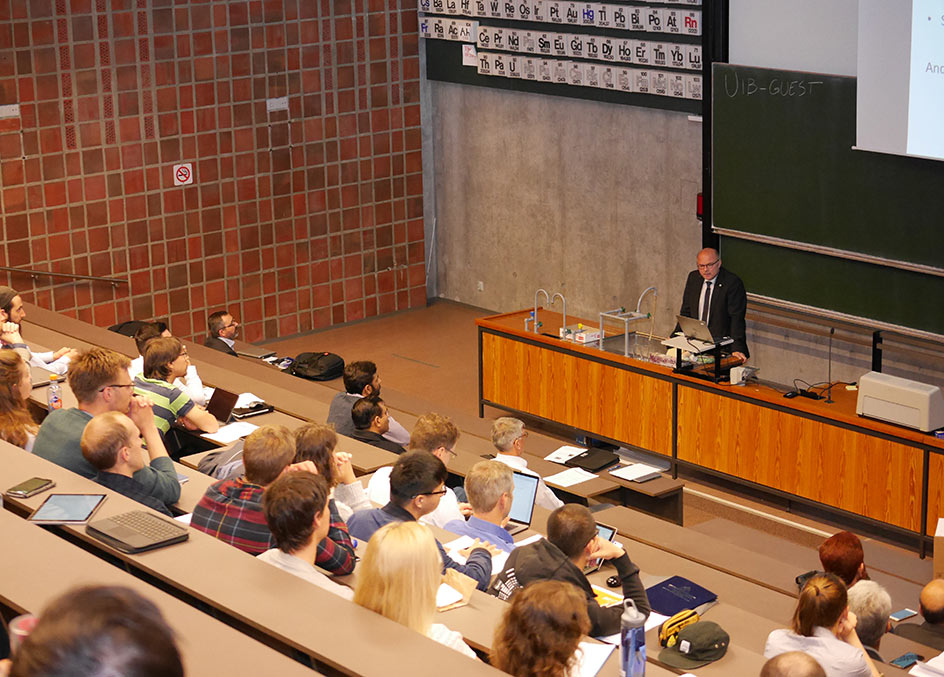-
ISRM courses
Dr Nick Barton writes:
It was good to see plenty of tunnelling education courses highlighted in your recent focus articles. In addition to those convened by international societies, the International Society of Rock Mechanics and Rock Engineering (ISRM) runs a series of speciality conferences referred to as TBM DiGs focusing on the operation of TBMs in difficult grounds. The third in the TBM DiGs series will be in Wuhan, China, in late November 2017. More details available on the event website.
See the full Feedback contribution at the bottom of this article page and on the Feedback page and add your comments and contributions via our Feedback service.
Meeting demand for new generation professionals 12 Oct 2017
From high level PhD and MSc course graduates, to technically trained operatives, short courses attendees and industry apprentices, the drive to ensure the human resource of professionals for employment in all sectors of the underground design, construction and ancillary support industries world wide is in high gear. It has been recognised that the underground work environment is not the place for unskilled casual labourers and the design and construction of underground structures is not the same as building any other civil engineering structure. The professionals at all levels are needed.
Taking the UK as a national example, there are now many and varied opportunities for new recruits to the tunnelling industry to obtain the necessary introduction and knowhow. Most of these efforts and programmes are fully supported by the country’s national society of tunnellers the British Tunnelling Society (BTS).
There is recognition also that while some countries of the world can manage the education and training needs for its domestic demand, others require the assistance of these advanced countries and with volunteers from the countries to dedicate their time to assist aspiring professionals in developing nations. Before there were tunnelling specific courses in universities and colleges, the BTS has run its now well-established Tunnel Design & Construction Course every year in the July.
The five-day residential course has been running for several decades and this year attracted 72 delegates, including participants from Hong Kong, India, Indonesia, Spain, France, Canada and five delegates sponsored on the course by the BTS. In 2016, the course hosted 82 delegates from Singapore, Kenya, Qatar, Finland, Ireland, Egypt and Hong Kong and the 89 delegates at the 2015 course saw the best year ever, where UK delegates were joined by delegates from Brazil, Hong Kong, Switzerland, Denmark, Dubai.
Course fees for the five-day intensive course range from £1,200 for non-resident delegates to £1,575 for a non BTS-Member full room and board live-in delegate. With leading UK professionals presenting the lectures, this is exceptional value and many professionals now in the industry received their introduction to their career in tunnelling on this course. In addition to a link to all the presentations after the course, each delegate receives a large lever arch file of course notes and materials on the first day and receives a hard copy of two publications – Monitoring Underground Construction and Specification for Tunnelling, Third Edition. At the end of the course, each delegate receives a Continuing Professional Development certificate from the BTS and while there is hard work of study during the day, social events include sporting activities and group dinners.
In addition to the summer design and construction course, the BTS runs a course in underground environment health and safety each year in November and at the Institution of Civil Engineers in London. It too is highly regarded and attracts delegates from far and wide.
For technical training, the BTS sponsors the TunnelSkills subdivision of the national ConstructionSkills programme with the intent of attracting young school leavers into a construction industry profession in the world of underground construction.
The programme provides a series of employment-based courses with the performance of candidates regularly assessed by a certificating authority towards recognized National Vocational Qualifications (NVQs).
In the UK there are also now several industry academies providing vocational training, sponsored by government and industry and based on the major infrastructure projects currently progressing. Starting with the first, the Tunnelling and Underground Construction Academy (TUCA) in East London and sponsored by the Crossrail project, which remains active and training workers for Crossrail 2 as well as the Tideway, High Speed 2 and other current and near future tunnelling projects, there is now also an academy in Doncaster training professionals to build, operate and maintain the infrastructure and services of the High Speed 2 railway project between London and Birmingham and on further north in future phases.
Added recently as a TunnelSkills curriculum and held at the TUCA Academy, is a five-day Tunnel Survey Course. With nine spaces available on each session to ensure full hands-on participation for each of the attendees, the course is recommended for graduates, technicians, surveyors or engineers who are new to the tunnelling and underground environment. The aim of the course is to equip surveyors and engineers with the surveying skills and knowledge required to enable them to safely and competently work in the tunnelling environment.
Added to these programmes there is also a concerted effort in the UK to expand apprenticeships with the contractors engaged on major construction contracts obliged to offer a minimum number of apprentice openings to ensure the foundation of a skilled workforce for the future.
University degrees
At the top end of the education spectrum are the university degrees and doctorates. Many universities of the world now offer higher education degrees in rock and soil mechanics, geotechnical engineering, civil engineering and now also specifically in the design and construction of tunnels and underground structures.
In the UK the year-long MSc in Tunnelling and Underground Space at the University of Warwick in Coventry, is offered to university graduates with an interest in this very specific discipline of engineering.
Origins of the UK MSc in Tunnelling
The value of higher education
Other leading university degree courses specifically in tunnelling include:
- MSc and PhD degrees in Underground Construction & Tunneling (UC&T) at the Colorado School of Mines in Golden, Colarado, USA
- MSc in Tunnelling at in the UK
- MSc in Tunnelling and Tunnel Boring Machines at the Politecnico Torino in Italy
- MSc in NATM Tunnelling at the Universities of Graz and Leoben in Austria
Other universities that include a strong focus on underground construction within their civil and geotechnical engineering curricula include:
- NTNU The Norwegian University of Science and Technology, Norway
- Univeristy of Cambridge, UK
- Imperial College London, UK
- Bochum University, Germany
- Tongji University, Shanghai, China
Attracting young professionals to careers in tunnelling
As all countries of the world look towards an new era of major underground works for national and international transportation, energy, water supply and urban expansion services, the need for more well educated and skilled professionals in underground design and construction will only grow. Presenting the industry as an attractive career path for both men and women is required and is a challenge taken up by new groups and associations.
Young professionals in the UK were the first to organize a Young Members group of the BTS and from this many others have followed the example to support new recruits to the industry in their career choice.
Supporting women in the industry
Attracting young professionals to careers in tunnelling
The following Young Member groups are now well established:
Scholarships and bursaries are offered by many tunnelling societies of the world and these have supported the further education and training of many new recruits to the industry.
Women represent one of the largest pools of untapped new talent for the tunnelling industry. Where construction - and underground construction in particular - have been a traditional preserve of men, professional women have been missing from the line-up. This too is changing, and rapidly, with support via equal opportunity legislation, education opportunities and tunnelling society support.
Taking a lead, to create a forum for women in the profession to share experiences and discuss concerns, the Women in Tunnelling group has been established in the United States and all are welcome.
References
- UK High Speed Rail College – TunnelTalk, November 2015
- Promoting the underground and meeting demand – TunnelTalk, January 2015
- Young engineers compare shadow designs – TunnelTalk, January 2014
- Presenting the tunneling career possibilities – TunnelTalk, Februry 2013
- Prospects and pay scales attract new recruits – TunnelTalk, June 2012
- Kuala Lumpur opens tunnel Training Academy – TunnelTalk, Decenber 2011
- Closing the gender gap in tunnelling – TunnelTalk, March 2015
- Diary Dates: Short course and training sessions
Feedback
Courses offered by the ISRM
Feedback from: Nick Barton
It was good to see plenty of tunnelling education courses highlighted in your recent focus articles. I guess that beyond those organized, to a greater or lesser extent, by ITA, there are surely numerous instances of soft-ground tunnelling lectures and courses given by the International Society of Soil Mechanics.
The International Society of Rock Mechanics and Rock Engineering (recently extended title but same ISRM acronym) has international conferences with numerous lectures on both open-face and TBM tunnelling, plus speciality conferences such as the present series referred to as TBM DiGs focusing on the operation of TBMs in difficult grounds. The third in the TBM DiGs series will be in Wuhan, China, in late November 2017. More details available on the event website.
So there are plenty of soil and rock experts ready to help try to interpret what the unpredictable ground has thrown in the way of expected tunnelling progress. And as we see from the TunnelTalk reviews of collapses, there are enough problems to keep many soil and rock consultants busy.
Gravity never takes a rest - either in the tunnelling or medical profession - and there are all those lateral components with unwanted water pressures and poorly resisting ground. The TBM profession has yet to acknowledge the deceleration of progress rates over extending distance, as illustrated also in world record progress performances, and the link between rock quality and delays, given by a simple equation. I wonder if such points have been discussed in the numerous courses highlighted in the TunnelTalk articles.
With regards,
Dr Nick Barton
References
- Ground freezing TBM drive collapse in Germany – TunnelTalk, August 2017
- Subsea tunnels for oilfield development – TunnelTalk, November 2013
- Record drill+blast work in Norway – TunnelTalk, January 2009
|
|
|
|
|
Add your comment
- Thank you for taking the time to share your thoughts and comments. You share in the wider tunnelling community, so please keep your comments smart and civil. Don't attack other readers personally, and keep your language professional.




